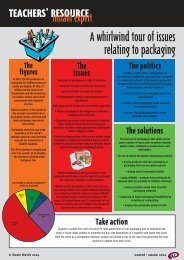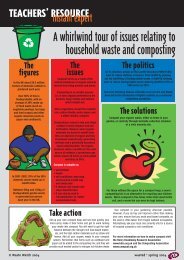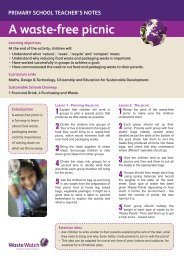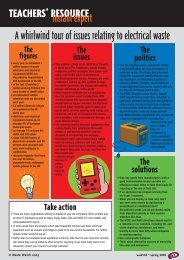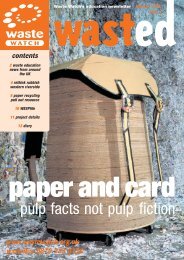Metals - Recyclezone
Metals - Recyclezone
Metals - Recyclezone
Create successful ePaper yourself
Turn your PDF publications into a flip-book with our unique Google optimized e-Paper software.
TEACHERS’ RESOURCE<br />
useful websites<br />
All the information you need is out there on the<br />
internet – somewhere! We tell you where to look.<br />
Ollie Recycles<br />
www.ollierecycles.com/uk<br />
A child friendly website full of games,<br />
puzzles and information. Ollie and his<br />
friends show you around and teach<br />
you more about the 3Rs – Reduce,<br />
Reuse and Recycle. Click on ‘Recycle’<br />
in the ‘Explore’ section to find facts<br />
and figures about steel and<br />
aluminium, including what we use<br />
them for and how they can be<br />
recycled. There are also quizzes to<br />
test your knowledge and a curriculum<br />
checklist for teachers.<br />
the French army There is a children’s<br />
zone with games and information and<br />
you can submit questions to find out<br />
more about steel can recycling.<br />
Waste Online<br />
www.wasteonline.org.uk<br />
The place to go for information sheets<br />
on the recycling of aluminium, steel<br />
packaging and lots more. Good<br />
background information for teachers<br />
and also useful for research work by<br />
secondary students.<br />
Junk to Gems<br />
www.junktogems.org.nz<br />
An inspirational and attractive site<br />
showing art made from junk by both<br />
children from New Zealand and a<br />
selection of British artists, some of<br />
whose work utilises reclaimed iron,<br />
steel washing machine drums and<br />
lager cans. Why not use this site as a<br />
starting point to do a similar art<br />
project in your own school There are<br />
also printable posters on the recycling<br />
of steel, aluminium and other<br />
materials.<br />
Use It Again<br />
www.useitagain.org.uk<br />
A website designed to help make it<br />
easy for you to ‘do your bit’ in the<br />
battle to reduce waste. Click ‘How<br />
can we do our bit’ and then<br />
‘Recover’ and ‘Recycle’ to find a<br />
relatively simple text, suitable for<br />
upper Key Stage 2 pupils, about steel<br />
and aluminium and how they can be<br />
recycled.<br />
School Science<br />
www.schoolscience.co.uk<br />
A site about school science and its<br />
applications which contains a number<br />
of sections on copper, covering such<br />
things as its uses, the mining and<br />
extraction of copper and copper<br />
recycling.<br />
Cash for Cans<br />
www.cashforcans.co.uk<br />
All you need to know about aluminium<br />
recycling, including how to use this to<br />
raise money for your school. Take an<br />
interactive tour around Europe’s<br />
largest aluminium can recycling plant<br />
from where you can even download<br />
video clips of the process in action.<br />
Also on the site are games,<br />
downloadable desktops and<br />
screensavers, and printable posters<br />
and information packs.<br />
UK Aluminium Packaging<br />
Recycling Organisation<br />
www.alupro.org.uk<br />
A really useful website with sections<br />
on diverse aspects of aluminium<br />
recycling. There’s a searchable<br />
database for finding your nearest<br />
recycling facility, education resources,<br />
downloadable images, information on<br />
how community schemes can raise<br />
money from scrap aluminium, and<br />
much, much more.<br />
Steel Can Recycling<br />
Information Bureau<br />
www.scrib.org<br />
More cans, this time made of steel.<br />
Did you know that steel cans have<br />
been used for food packaging since<br />
1810, when Nicholas Appert<br />
responded to Napoleon's challenge to<br />
invent a method of preserving food for<br />
Focus on Guinea<br />
Location<br />
Population<br />
Capital<br />
Geography<br />
Main river<br />
Guinea is on the west coast of Africa<br />
7.5 million<br />
Conakry<br />
The majority of the country is a flat coastal<br />
plain, rising to a hilly interior.<br />
Niger<br />
Guinea and aluminium<br />
A West African country and former French colony, Guinea<br />
has a rich collection of wildlife in its forests and savannah,<br />
and rich reserves of natural resources including iron ore,<br />
diamonds, gold, uranium and bauxite.<br />
Guinea has 4 topographical regions: Lower Guinea (coastal plain with lagoons and mangroves),<br />
The Fouta Djallon Highlands (to the east where the major rivers Niger, Senegal and Gambia rise),<br />
Upper Guinea (savannahs which are home to a variety if wildlife including many monkeys,<br />
hyena, hippopotamus and poisonous snakes), and the Forest Region (tropical rainforest of teak,<br />
mahogany and ebony to the southwest).<br />
Guinea’s economy is highly dependent upon mining, especially iron ore and bauxite, the raw<br />
material for aluminium production. Guinea is the world’s second largest producer of bauxite,<br />
after Australia, and this accounts for 12% of the country’s GNP, more than 90% of its exports.<br />
However, only a small percentage of the population are employed in the mining sector, with 80%<br />
of Guinea’s workforce employed in agriculture.<br />
The preferred mining method is strip mining (or open cast) where covering vegetation is<br />
removed and after explosive charges are used to loosen the seams of bauxite, the ore is<br />
extracted by mechanical diggers.<br />
This mining technique can be extremely disruptive to the existing wildlife, and poses a threat to<br />
the habitats of rare monkeys and birds that inhabit Guinea’s forests.<br />
Three conglomerate companies dominate the bauxite mining. Each of these conglomerates is<br />
made up of multi-national mining companies. A lesser proportion is controlled by Guinea itself.<br />
Source: Encyclopedia Brittanica; United Nations Third World Forum; New Internationalist.<br />
8 summer 2003 • wasted



